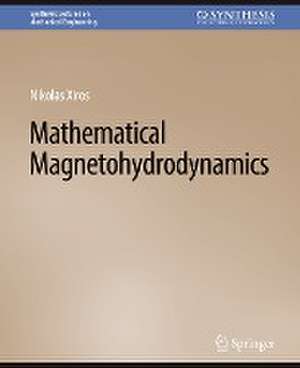Mathematical Magnetohydrodynamics: Synthesis Lectures on Mechanical Engineering
Autor Nikolaos Xirosen Limba Engleză Hardback – 24 ian 2018
Din seria Synthesis Lectures on Mechanical Engineering
-
 Preț: 396.31 lei
Preț: 396.31 lei - 19%
 Preț: 453.48 lei
Preț: 453.48 lei -
 Preț: 326.17 lei
Preț: 326.17 lei -
 Preț: 199.35 lei
Preț: 199.35 lei -
 Preț: 197.44 lei
Preț: 197.44 lei - 15%
 Preț: 525.54 lei
Preț: 525.54 lei -
 Preț: 328.08 lei
Preț: 328.08 lei -
 Preț: 321.34 lei
Preț: 321.34 lei -
 Preț: 207.83 lei
Preț: 207.83 lei - 15%
 Preț: 526.35 lei
Preț: 526.35 lei -
 Preț: 393.52 lei
Preț: 393.52 lei - 18%
 Preț: 577.56 lei
Preț: 577.56 lei -
 Preț: 320.20 lei
Preț: 320.20 lei -
 Preț: 320.40 lei
Preț: 320.40 lei -
 Preț: 488.33 lei
Preț: 488.33 lei -
 Preț: 383.72 lei
Preț: 383.72 lei -
 Preț: 224.65 lei
Preț: 224.65 lei -
 Preț: 448.21 lei
Preț: 448.21 lei -
 Preț: 225.79 lei
Preț: 225.79 lei -
 Preț: 279.81 lei
Preț: 279.81 lei - 19%
 Preț: 448.41 lei
Preț: 448.41 lei - 19%
 Preț: 459.83 lei
Preț: 459.83 lei -
 Preț: 416.01 lei
Preț: 416.01 lei - 19%
 Preț: 451.30 lei
Preț: 451.30 lei - 19%
 Preț: 478.36 lei
Preț: 478.36 lei -
 Preț: 415.24 lei
Preț: 415.24 lei -
 Preț: 260.18 lei
Preț: 260.18 lei -
 Preț: 416.01 lei
Preț: 416.01 lei -
 Preț: 452.40 lei
Preț: 452.40 lei -
 Preț: 390.25 lei
Preț: 390.25 lei -
 Preț: 413.45 lei
Preț: 413.45 lei -
 Preț: 225.71 lei
Preț: 225.71 lei -
 Preț: 351.41 lei
Preț: 351.41 lei -
 Preț: 383.12 lei
Preț: 383.12 lei -
 Preț: 225.56 lei
Preț: 225.56 lei -
 Preț: 166.82 lei
Preț: 166.82 lei - 19%
 Preț: 447.03 lei
Preț: 447.03 lei -
 Preț: 457.72 lei
Preț: 457.72 lei - 19%
 Preț: 458.39 lei
Preț: 458.39 lei -
 Preț: 459.02 lei
Preț: 459.02 lei - 19%
 Preț: 441.30 lei
Preț: 441.30 lei - 19%
 Preț: 442.75 lei
Preț: 442.75 lei -
 Preț: 415.24 lei
Preț: 415.24 lei -
 Preț: 191.31 lei
Preț: 191.31 lei -
 Preț: 180.41 lei
Preț: 180.41 lei -
 Preț: 226.56 lei
Preț: 226.56 lei -
 Preț: 383.72 lei
Preț: 383.72 lei
Preț: 386.31 lei
Nou
Puncte Express: 579
Preț estimativ în valută:
73.92€ • 79.05$ • 61.63£
73.92€ • 79.05$ • 61.63£
Carte tipărită la comandă
Livrare economică 14-21 aprilie
Preluare comenzi: 021 569.72.76
Specificații
ISBN-13: 9783031796029
ISBN-10: 3031796020
Ilustrații: X, 155 p.
Dimensiuni: 191 x 235 mm
Editura: Springer International Publishing
Colecția Springer
Seria Synthesis Lectures on Mechanical Engineering
Locul publicării:Cham, Switzerland
ISBN-10: 3031796020
Ilustrații: X, 155 p.
Dimensiuni: 191 x 235 mm
Editura: Springer International Publishing
Colecția Springer
Seria Synthesis Lectures on Mechanical Engineering
Locul publicării:Cham, Switzerland
Cuprins
Plasma Definition and Classification.- Collisions in Plasmas.- Motion of Charged Particles.- Plasma as a Fluid.- Transport.- Plasma Boundary.- Plasma-surface Interaction.- Particle Waves and Resonances.- Electromagnetic Waves.- Plasma Modeling.- Low-temperature DC Plasma.- Low-temperature RF Plasmas.- Magnetic Confinement Nuclear Fusion Plasma.- References.- Author's Biography.
Notă biografică
Nik. Xiros is a JL Goldman endowed Professor and Chair of the Bollinger School of Naval Architecture and Marine Engineering as well as a Professor of Electrical and Computer Engineering at the University of New Orleans. His career spans more than 25 years in industry and academia. His research and teaching activities encompass marine and ocean engineering process modeling and simulation, system identification, dynamics and control, reliability, signal and data analysis with emphasis on propulsion, power, energy and renewables as well as mechatronics, electromechanical and autonomous systems. His education includes an Electrical & Computer Engineering Dipl. Eng. degree (MEng. equiv.), a MSc in Mathematics, a MSc in Applied Physics and a Naval Architecture & Marine Engineering Dr. Eng. degree.
